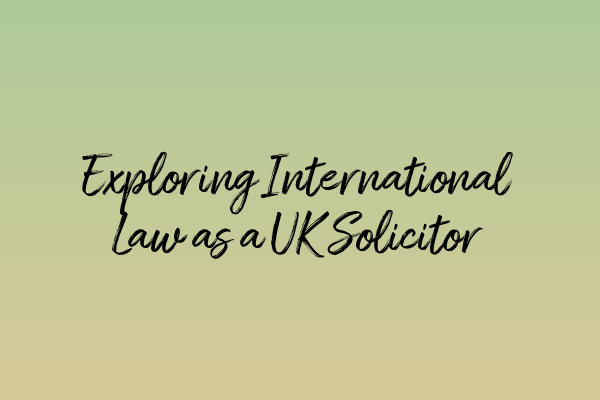Exploring International Law as a UK Solicitor
As a UK solicitor, you have the opportunity to broaden your horizons and expand your legal expertise beyond the borders of your own jurisdiction. International law presents an exciting and challenging field of practice that allows you to navigate the complexities of global relationships and protect the interests of your clients on an international scale.
Before we delve into the intricacies of international law, let’s start by understanding what it entails. International law, also known as public international law, is a set of rules and regulations that govern the relations between nations. It encompasses a wide range of legal issues, including but not limited to diplomacy, trade, human rights, and armed conflict.
As an UK solicitor, your fundamental knowledge and skills in domestic law serve as a solid foundation for exploring international law. However, it is important to recognize that international law operates differently from domestic law in several aspects.
Types of International Law
International law can be categorized into two main types: public international law and private international law.
Public international law governs the relationships between nations and organizations on a global level. It includes treaties, customary international law, and the decisions of international courts and tribunals. This branch of international law deals with topics such as human rights, humanitarian law, and international criminal law.
Private international law, also known as conflict of laws, focuses on resolving legal disputes involving individuals and companies with connections to multiple jurisdictions. It determines which laws should apply in cases where multiple legal systems are involved. This branch of international law covers areas such as international contracts, cross-border disputes, and international family law matters.
International Organizations and Treaties
International organizations play a crucial role in the development and enforcement of international law. These organizations, such as the United Nations (UN), the International Court of Justice (ICJ), and the World Trade Organization (WTO), work towards promoting peace, resolving disputes, and ensuring compliance with international legal obligations.
Treaties are another essential component of international law. Treaties are binding agreements between nations that establish rights and obligations. The UK is a party to numerous international treaties, addressing various aspects of international relations. Familiarizing yourself with these treaties and their implications is vital when navigating international legal issues.
Areas of Practice within International Law
International law offers a diverse range of practice areas for UK solicitors. Some popular areas of practice include:
- International Trade Law: This field deals with the regulation of international trade and commerce, including import and export laws, tariffs, customs regulations, and international trade disputes. Understanding the intricacies of international trade law is essential for businesses engaging in global trade.
- International Human Rights Law: International human rights law focuses on protecting and promoting human rights globally. It involves advocacy for individuals and groups facing human rights violations, as well as addressing human rights issues in armed conflicts, refugee crises, and other global challenges.
- International Criminal Law: International criminal law encompasses the prosecution of individuals for serious crimes of international concern, such as genocide, war crimes, and crimes against humanity. Working in this field allows UK solicitors to contribute to global justice and hold perpetrators accountable.
- International Litigation and Dispute Resolution: With the globalization of business, cross-border disputes have become more common. International litigation and dispute resolution involves resolving legal disputes that arise from international contracts, trade agreements, and international investments.
Mastering the intricacies of these areas of practice requires a comprehensive understanding of international law principles, as well as staying up-to-date with the latest developments in international legal frameworks.
Skills Required
Exploring international law as a UK solicitor requires specific skills and competencies. Some important skills to develop in this field include:
- Research and Analytical Skills: International law often involves dealing with complex legal frameworks and multiple jurisdictions. Strong research and analytical skills are necessary to analyze international legal issues and provide effective legal advice to clients.
- Communication and Negotiation Skills: Effectively communicating and negotiating with clients, other lawyers, and stakeholders from different cultural backgrounds is essential in international law. Strong interpersonal skills and cultural sensitivity are crucial for successful outcomes.
- Language Proficiency: Having proficiency in additional languages is advantageous when dealing with global clients and working on international cases. It allows for better communication and understanding of different legal systems.
Related Articles:
- SQE Prep: Tips and Tricks to Excel in Criminal Law
- Cross-Examination Techniques: Mastering the Art of Questioning
- Private Prosecutions: Exploring Non-Governmental Prosecutions in Criminal Cases
- Ethical Challenges in Criminal Defence: Navigating Dilemmas
- Assault and Battery Laws: Understanding the Legal Parameters


Leave a Reply